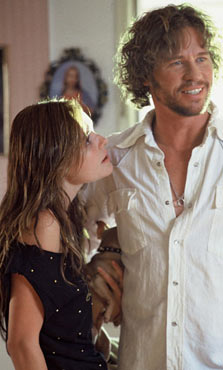 When Lolita escapes the clutches of Humbert Humbert, she marries and moves to Alaska, becoming “Mrs. Richard F. Schiller”. “Schiller” is also the surname of Dawn Schiller, the young girl under the spell of porn star John Holmes in the mesmerizing “Wonderland”. I do not know for sure if Dawn’s name is fictitious or not, but I assume that, under the circumstances, there’s a good chance that it is. When Lolita escapes the clutches of Humbert Humbert, she marries and moves to Alaska, becoming “Mrs. Richard F. Schiller”. “Schiller” is also the surname of Dawn Schiller, the young girl under the spell of porn star John Holmes in the mesmerizing “Wonderland”. I do not know for sure if Dawn’s name is fictitious or not, but I assume that, under the circumstances, there’s a good chance that it is.
If so, it may have been a deliberate allusion to Nabokov’s doomed nymphet. Dawn, at fifteen, was only a few years older than Lolita when she took up with porn star John Holmes. Holmes is every bit the beast that Humbert Humbert is, and the movie, like Nabokov’s masterpiece, challenges the ability of the reader to see through the lies, often charming, of the wicked enchanter who has ensnared his young lover.
The strength of “Wonderland” is not necessarily the story itself, a true crime potboiler which could have been told fairly straightforwardly, but rather how director James Cox creates a rich narrative puzzle by teasing out the varying accounts of the Wonderland murders (four people killed in what was described as the worst mass murder since Manson). The audience is given different stories, a bit like “Rashomon”, and along with the baffled cops must attempt to piece together the truth.
Cox uses a host of split-screen, comic-book panel effects, mimicking the newspaper headline graphics in “L.A. Confidential”, to lend a quicksilver, tabloid quality to the visuals (which at times gives the film an over-directed feel). He understands a key point about life in Los Angeles: maps, particularly Thomas Brothers Guides. A few sequences involve lines on a street map indicating driving routes taken to locations in the Hollywood Hills, and they’re as much a symbol of Los Angeles as the sunshine, palm trees, and hookers on Vine.
At the center of the maelstrom of confusion is John Holmes, played by Val Kilmer, in a nuanced performance that has a lot in common with his portrayal of Jim Morrison in “The Doors”. Kilmer’s sulky, tortured hero gets by on his childlike vulnerability, which those around him seek to protect even as he injures them. His essential sweetness lifts an otherwise sordid tale out of the usual addict-bottoming-out cesspool in which most drug films wallow.
There’s a point during his confession to Sharon at which he realizes he might be in great trouble, and like a young boy his hands involuntarily rise to his lips, terrified at the thought of punishment. Kate Bosworth’s doe-eyed Dawn, the innocent whose heart of gold we hope will escape ruin, predictably wants to save John from himself. At first, she seems the most naive and therefore victimized of all the characters in the film because she demands so little from John. “I’m his girl”, she explains to Sharon, John’s estranged wife (a stern and sturdy Lisa Kudrow), and that’s good enough for her.
But although John’s friends, enemies, and investigating detectives attempt to get closer to the truth by poking and prodding his stories, they don’t quite understand the sway that John Holmes has over them. For his basehead transgressions he should have long ago been ostracized, yet everyone keeps him around, even those who seem to despise him. John knows it, too. He asks Sharon why she hasn’t divorced him if she wants him out of her life so badly, and she has no answer, just a frustrated roll of the eyes.
Only Dawn knows she will succumb to whatever power it is that John holds over her. Why bother trying to see through a transparent man? John’s “power” could have been nothing more than his physical endowment, emphasized the first time we see him, a scene in which he bursts into a room and the camera does a smash zoom on his crotch before panning up to find Kilmer’s sophomoric grin. Ironically the starmaking appendage is the least of it, though. John’s radiant charm is that of a washed-up actor who still believes he is a star.
And not a starred star, either. For John, there’s no asterisk beside his name in the book of cinema history. He is Johnny Wad, movie star. Period. As low as he goes in his life as a penniless junky, there is always that boyish reassurance in his eyes that his existence is blessed, set apart from the others because he has appeared in the magic mirror of the cinema screen.
Cox eschews the sex jokes and focuses on what’s going on above John’s waistline. For instance, sex is shown as painful for Dawn, and the one and only appearance of John’s special talent becomes a bitter humiliation to him. If Cox uses John’s legendary prowess for anything, it’s metaphorically: celebrity idolatry as phallic worship.
The movie is a fascinating and representative look at the potency of star power in Hollywood, even at its lowest, seediest levels where surely everyone ought to be able to see through its cracked illusions—and can’t. All the more intriguing because Dawn and Sharon consulted on the film, “Wonderland” is a clever yarn about stars and those who can’t help but worship them. |